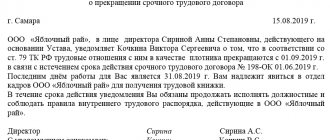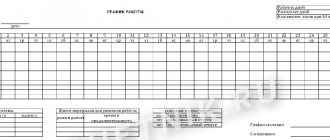Things to consider
When preparing a seasonal employment contract, it is necessary to take into account some of the features of this document, which are regulated by the Labor Code and some other legal acts.
The definition of seasonal work and its duration is contained in Article 293. Labor Code. Employment contracts with seasonal workers are concluded on a general basis, but with some features prescribed in Art. 46 of the Labor Code.
So, according to Art. 239 of the Labor Code, it is necessary to take into account the exact start date of work and duration based on local acts approved by the employing company. If there are none, then the date according to Government Decree No. 382 is indicated as the basis for indicating the start date of cooperation with the employee.
The duration of the agreement is determined by agreement of the parties. In addition to the terms, the employer is obliged to indicate the reason for concluding a seasonal contract. According to Art. 59 of the Labor Code, the basis for signing an agreement of this type is “performing seasonal work, when work can only be carried out during a certain time period (season).” According to Art. 294 of the Labor Code of the Russian Federation, a condition regarding the seasonal nature of the work performed must be included in the contract.
The employer should also take into account in the process of preparing the contract:
- List of seasonal work according to NKT Resolution No. 186 , the latest edition of which dates back to 1988.
- List of seasonal sectors in industry No. 381 , approved in 1991.
- List of seasonal work No. 382 , which are used in taxation, as amended in 2014.
- List of works where work is counted as a full working year , No. 498 of 2002, as amended in 2014.
Seasonal contracts mean contracts that are concluded with employees to perform seasonal work for a period of 6 months or more. Such contracts can be considered as a type of fixed-term employment contracts.
Arbitrage practice
It is necessary to distinguish between the seasonal nature of work and seasonal demand for products produced by the organization.
Thus, in the ruling of the Perm Regional Court dated April 18, 2011 in case No. 33-3685, the latter indicated that since the defendant did not provide evidence that the increase in production was obviously temporary, lasting no more than a year, the company had no grounds for concluding plaintiff of a fixed-term employment contract. At the same time, in order to justify the possibility of concluding a fixed-term employment contract, the defendant’s arguments boiled down to the fact that there was a demand for spring products depending on the season, and therefore a fixed-term employment contract was concluded with the employee. In the above case, when demand for products increases, the employer has the right, by local regulations, to establish for employees with piecework-bonus wages a summary accounting of working hours for the period of increased demand for products. According to Art. 104 of the Labor Code of the Russian Federation, when, due to the conditions of production (work) of an individual entrepreneur, in the organization as a whole, or when performing certain types of work, the daily or weekly working hours established for a given category of workers cannot be observed, it is allowed to introduce summarized recording of working hours so that so that the duration of working hours for the accounting period (month, quarter and other periods) does not exceed the normal number of working hours. The accounting period cannot exceed one year. The procedure for introducing summarized recording of working time is established by the internal labor regulations.
For example, the Supreme Court of the Udmurt Republic, in a cassation ruling dated March 21, 2011 in case No. 33-863/11, recognized as legal the employer’s actions to introduce internal labor regulations of a 6-day working week with a working day of 8 hours a day (48 hours a week) from April 1 to September 30 for workers performing seasonal work. Thus, the criterion for determining the seasonal nature of work is the connection with natural conditions; lists of work are established by industry agreements; Soviet acts are applied retrospectively; in the absence of a list, the court has the right to examine the nature of the work and establish its seasonal nature.
For how long is the seasonal contract concluded?
An employment contract with seasonal workers is concluded only to perform certain work for a limited period of time (season).
It is worth noting that, according to Federal Law No. 90, the definition of “seasonal work”, which was previously used in the Labor Code, has changed somewhat. If earlier it was stated here that the term of such an employment contract cannot exceed 6 months, now the phrase “not exceeding” has been replaced by “as a rule, not exceeding.” Literally, this means that the term of an employment contract can now exceed 6 months.
The maximum duration of seasonal work is determined in industry or inter-industry agreements signed at the federal level within the framework of social partnership (under Part 2 of Article 293 of the Labor Code of the Russian Federation).
Right to vacation
According to Art.
295 of the Labor Code of the Russian Federation, seasonal workers have the right to paid leave. It is provided at the rate of two working days for each month of work. This norm appeared in domestic labor legislation only in 1991. Before this, seasonal workers did not have the right to leave, which was recognized by the Committee on Constitutional Supervision as contrary to the Constitution of the USSR. Vacation may be granted with subsequent dismissal, and if the duration of the vacation exceeds the term of the employment contract, the day of dismissal will be considered the day the vacation ends (Part 2 of Article 127 of the Labor Code of the Russian Federation). Vacation payment is carried out in accordance with clause 11 of the Regulations on the specifics of the procedure for calculating average wages, approved by Decree of the Government of the Russian Federation of December 24, 2007 No. 922. The average daily earnings are determined (the ratio of the amount of actually accrued wages to the number of working days according to the calendar of a six-day working week, per working hours worked) and multiplied by the number of working days of vacation to be paid. If a seasonal employee has the right to additional paid leave on the basis of Art. 116 of the Labor Code of the Russian Federation (for example, for work with harmful and dangerous working conditions, irregular working hours), then such leave should be calculated according to the general rules. Typically, seasonal employees do not take vacations. A seasonal employee who does not use vacation has the right to compensation.
How to apply
An employee is hired under a seasonal employment contract on a general basis. Upon employment, the employee provides the employer with the necessary documents under Art. 65 Labor Code. The employer must first approve the duration of seasonal work, as well as the number of workers he needs for the season according to the staffing schedule.
An employment contract is concluded in writing with the issuance of an order for employment. The peculiarity of the order will be that it must indicate the seasonal nature of the work. Based on the results of signing, an entry is made in the employee’s work book and in other personnel documents (personal card).
Taking into account changes to the Labor Code according to 90-FZ, Part 2, Art. 294 has lost legal force. It was stated here that the duration of the probationary period with a seasonal worker cannot exceed 2 weeks. Now, seasonal employees are subject to the general rules for establishing a probationary period - no more than 3 months. But the employer is not obliged to establish a probationary period and can sign an agreement without it.
Shape and Features
An employment contract with a seasonal worker must be concluded in writing. There is no regulated form for its conclusion with seasonal employees.
The employer can use the standard form of the employment contract adopted by the organization. At the same time, he should indicate in such an agreement the duration of its validity and the nature of the work performed (seasonal, due to climatic reasons).
A sample fixed-term employment contract for seasonal work can be downloaded here.
Features of employment under a fixed-term employment contract
A fixed-term employment contract, just like a regular employment contract (EL), concluded between an employer and an employee, is the main document regulating the labor relations between the parties (Articles 56, 57 of the Labor Code of the Russian Federation).
The main difference between these contracts is the period for which they are concluded.
A simple TD is concluded for an indefinite period. That is, only the date the employee was hired is known.
An urgent TD is concluded for a specific period, which must be specified in it. It cannot exceed 5 years. If the specified period of the employment relationship is greater than the maximum permitted, then the contract becomes open-ended and the employee will be considered hired on a permanent basis.
As a rule, an agreement is drawn up with the general director for a certain period. A sample of such an agreement can be found here.
IMPORTANT! If, after the expiration of the urgent TD, neither party has demanded its termination and the employee wishes to continue working for the company, the conditions stipulated in the urgent TD lose their force, and the employee is considered hired for an indefinite period.
Who can be hired under a fixed-term employment contract?
A complete list of persons and conditions that must be observed when hiring an employee on an urgent TD is given in Art. 59 Labor Code of the Russian Federation. This may be temporary work, part-time work or seasonal work (for example, replacing a sick employee, an essential employee, an employee on leave, or work that is performed during a specific period of time). In case of non-compliance with the conditions listed in Art. 59 of the Labor Code of the Russian Federation, the contract will be considered unlimited.
One of the reasons for concluding an urgent TD is the limited period of its validity. It is this circumstance that gives the employer the opportunity to influence the employee. After all, the employer may simply not renew the contract with the employee without explanation. But even in this case, the employer must notify the employee of dismissal 3 days before the end of the urgent TD.
ConsultantPlus experts explained step by step how to correctly draw up a fixed-term employment contract. To do everything correctly, get trial access to the system and go to the Ready solution. It's free.
How to properly fire a conscript, read the articles:
- “The procedure for dismissal under a fixed-term employment contract”;
- “How to write a notice of termination of a contract - sample?”;
- “Termination of a fixed-term employment contract upon expiration of the term.”
Structure and content
The structure and content of all employment contracts with seasonal workers is determined at the discretion of the parties. But it is advisable to include the following conditions in such an employment contract:
- The name of the document (indicating its peculiarity - seasonality) and the serial number assigned to it, according to the accepted numbering system.
- Place and date of preparation of the employment contract.
- Name and details of the parties: full name, position, details of company documents and personal data of the future employee.
- Subject of the signed agreement: the employee’s place of work, exact address, whether his place of work is his main or additional one; the employee’s working conditions in the company and the degree of his subordination.
- Duration of the employment contract: beginning and end of cooperation, conditions and remuneration, nature of the work.
- Rights and obligations of the parties.
- Work and rest schedule.
- Employee social insurance , its guarantees and compensation.
- Responsibility of the parties.
- Terms of termination.
- Additional terms.
- Details of the parties and signatures.
After all mandatory and additional conditions have been included in the employment contract, the documents have been signed by the employee and his employer, it becomes legally binding.
The terms of the signed agreement may be changed only by agreement of the parties, concluded in writing.









